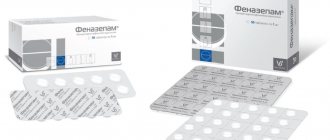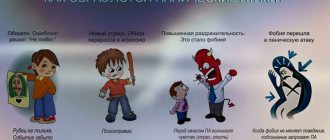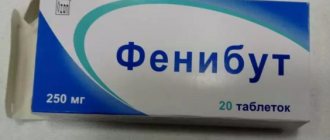What are the features of panic attacks during menopause?
During perimenopause, successive changes occur in the female body associated with a decrease in the function of the hypothalamus, the nerve center in the brain. It regulates the production of all hormones in the body and upon reaching the age of 45-50 years it begins to lose sensitivity to the effects of estrogen. Feedback to the ovaries is disrupted, and the production of female hormones decreases.
In addition to regulating reproductive processes, estrogen and progesterone ensure normal conduction of the nerve signal. When the level of these important hormones changes, the functioning of the nervous system is disrupted:
- the balance of inhibition and excitation processes in the central nervous system is disrupted;
- the conductivity of nerve fibers decreases;
- the regulation of the autonomic nervous system changes;
- the synthesis of hormones by other endocrine glands is activated;
- A large amount of catecholamines, adrenaline, cortisol and other “stress hormones” are released into the blood, which provoke the external manifestations of an attack.
The mechanism of development of a panic attack during menopause is associated with changes in the body. It is characterized by short-term disruptions of the endocrine and nervous systems. Severe attacks of anxiety are a sign of physiological or nervous disorders, pathology of the adrenal glands.
Risk factors
True panic attacks are recorded in 1/6 of the patients during menopause. The chances of occurrence increase with the following disorders: migraine, emphysema, heart and vascular disease, thyroid disorders, problems with the adrenal glands, allergies.
The issue of menopause should be critically considered when girls have previously experienced panic attacks. During menopause, panic attacks can be caused by factors that negatively affect the nervous system: stressful situations and emotional overload, tobacco, alcohol, restraining emotions, sleep problems, physical overload.
With hormonal imbalance during menopause, panic attacks are provoked much more often. It should be borne in mind that panic states may take into account the presence of certain mental disorders. Similar symptoms are characteristic of various phobias and depressive states.
Often panic attacks occur on the basis of post-traumatic disorders in complex injuries, dangerous circumstances, or disasters. Panic is common in patients with obsessive-compulsive pathologies . Patients with such diagnoses are regularly afraid of contracting some disease. Such diseases are reflected in their behavior.
All pathological processes during menopause become more complicated in girls with similar abnormalities. Therefore, their condition always worsens with the onset of menopause. In such a situation, therapy and consultation with a psychotherapist will be needed. The use of hormones does not make it possible to get rid of such problems. Signs of panic are conventionally divided into physical and mental.
How do panic attacks manifest during menopause?
The condition occurs suddenly, against a generally favorable background. Unmotivated outbursts of anxiety and fear complicate a woman’s life.
Mental manifestations
Mental and emotional symptoms are expressed as follows:
- Fear of death. Feeling of a threat to life, fear of loss of reason or serious illness, unknown impending danger.
- Anxiety or nervousness. It manifests itself in the form of concern for oneself or loved ones, accompanied by a premonition of trouble.
- Feelings of a lump in the throat. Not associated with food intake, but causes foreign body sensations and problems swallowing.
- Lightheadedness foreshadowing loss of consciousness.
These symptoms often occur in the morning or at night, interfering with proper rest, but they can also appear at other times of the day. A vegetative crisis is accompanied by emotional instability, and in severe cases, a woman develops a feeling of depersonalization.
Physical manifestations
Due to excess intake of hormones, physical disorders of organ activity also appear:
- palpitations with increased and frequent contractions, chest pain;
- an attack of heat or cold (hot flashes) associated with the effect of hormones on vascular tone;
- frequent breathing caused by vasospasm and lack of oxygen in the tissues;
- sweating and dry mouth due to malfunctions of the autonomic nervous system;
- diarrhea, nausea or belching, vomiting, abdominal pain that appears due to narrowing of blood vessels in the gastrointestinal tract;
- chills and cold extremities, dizziness and weakness.
These symptoms resemble a heart attack or acute poisoning, stomach disease and other serious conditions. The attack lasts 10-30 minutes, at the end of which there is often vomiting or excessive urination. After an attack, a woman feels general weakness.
Types of Panic Attacks
Panic attacks can occur both physiologically and psychologically. Most often, it can be difficult to separate these manifestations of a panic attack, since in each individual situation there is a different percentage of a combination of physical and mental.
Mental manifestations of attack
A panic attack occurs, first of all, in a woman’s mind. These manifestations can prevail over the physical ones, and have a more pronounced character: the woman feels a sense of impending danger, which in fact is not there. However, in her mind there is only the expectation of something negative that is about to happen to her. A woman cannot explain who or what she is afraid of. Moreover, it is impossible to dissuade her or try to explain that there is no negativity nearby. This idea, which arose in her mind, completely dominates the woman and is all-consuming at a certain moment.
Another type of consciousness disorder is fear of death. Unlike the feeling of danger, the fear of death is not so swift; it is not present here and now, but takes possession of a woman over a certain period of time (a week, a month, the last few days). The fear of death in some cases may weaken, but the unpleasant aftertaste that a woman may get sick and die remains. Thus, the problem itself does not go away, the degree of its intensity is only slightly reduced.
How to relieve a panic attack during menopause?
Menopause and panic attacks appear during a woman’s active age and can reduce her quality of life and interfere with her work and career. You can provide first aid to yourself or a loved one in simple ways:
- Try to distract yourself. Counting or reading in reverse order, distributing objects in order or 2-3 at a time and other simple mental actions can quickly relieve unwanted symptoms in an unstable mental state.
- Do breathing exercises. Take a diaphragmatic breath (belly) for 3 counts, hold your breath for 2 seconds. Exhale, counting from 1 to 5. After a pause of 2 seconds, repeat the action 15-20 times.
- Increase the carbon dioxide content in the blood. Inflate a plastic bag, inhaling air from it. In a public place, cup your palms and cover your mouth and nose with them, breathe for 30-60 seconds.
If attacks are repeated frequently and lead to exacerbations of diseases, you need to consult a doctor: a gynecologist and a neurologist. Specialists will prescribe medications for hormone replacement therapy. You cannot take medications on your own; their dosage is selected individually, and the course of treatment is determined by the doctor.
Prevention
The following preventive measures will help prevent panic attacks during menopause:
- Normalize your daily routine to eliminate excessive stress. You should set aside 8 hours for sleep and go to bed before midnight.
- Try to avoid stress and nervous irritation.
- Quit smoking and reduce alcohol consumption to a minimum.
- Increase your consumption of vegetables, fruits and berries, and reduce the amount of fatty foods.
- Drink at least 1.5 liters of clean water per day.
It is important to increase your stress resistance. Yoga or breathing exercises help with this.
Medications to help with anxiety
Let’s make a reservation right away: any medications must be prescribed by a doctor. Only a specialist who knows your individual characteristics and situation can recommend an effective remedy that will not only not harm, but will also help. If your doctor decides that the main factor causing your anxiety is a decrease in estrogen and progesterone levels, he may recommend hormone replacement therapy. In addition, when anxiety reaches a critical level, antidepressants are often prescribed. However, this choice requires special caution: anxiety and depression are still different problems.
23% of women suffer from anxiety disorders, which are not necessarily associated with depression.
In addition, antidepressants have many side effects. One of them is decreased libido. And a frustrated sex life is perhaps not the best way to combat anxiety.
It makes sense, together with your doctor, to choose a mild sedative that will support you in the fight for a more equal emotional state.
Pathology therapy
Treatment for a panic attack should be comprehensive. To normalize hormonal levels, a woman is prescribed hormone replacement therapy. Medicines must be taken strictly in prescribed doses so as not to provoke a deterioration in health.
If serious mental problems arise, it is recommended to consult a psychotherapist. However, such help is required only for those who had panic attacks before menopause. Most women are able to eliminate a panic attack on their own with simple tips:
- in case of breathing problems, you need to learn to breathe in your hands: firstly, it distracts from the main problem, and secondly, it helps to normalize breathing;
- It is better to perform breathing acts by counting;
- to distract from the state of panic, anxiety is driven away by switching to other ideas: you can count trees, cars passing by only a certain color, etc.;
- for some patients, a rubber band can be a salvation, with which you can lightly hit yourself on the wrist to relieve an attack and distract from negative thoughts;
- if you experience chest pain caused by cardiac problems, you can cough a little;
- If a panic attack occurs in women suffering from asthma or epilepsy, qualified help may be needed; you need to warn someone you know about this.
Panic attacks are an unpleasant phenomenon that must be treated. Such attacks do not go away on their own; the attending physician must know about their occurrence in order, if necessary, to schedule a consultation with another specialist and adjust the patient’s treatment.
Interesting and educational video on this topic:










